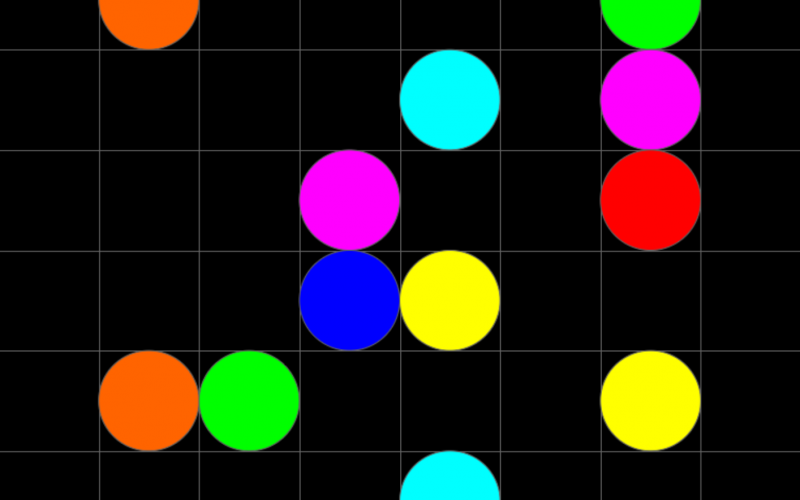int[][] board = {
{0, 1, 0, 0, 0, 0, 0, 2},
{0, 3, 0, 0, 0, 0, 4, 0},
{0, 0, 0, 0, 5, 0, 6, 0},
{0, 0, 0, 6, 0, 0, 2, 0},
{0, 0, 0, 1, 7, 0, 0, 0},
{0, 3, 4, 0, 0, 0, 7, 0},
{0, 0, 0, 0, 5, 0, 0, 0},
{8, 0, 0, 0, 0, 0, 0, 8}
};
int gw = 50,startx, starty, curx, cury; boolean selected = false, won = false;
color numToColor(int num) {
if (num==1) return color(0, 0, 255); if (num==2) return color(255, 0, 0);
if (num==3) return color(255, 100, 0); if (num==4) return color(0, 255, 0);
if (num==5) return color(0, 255, 255); if (num==6) return color(255, 0, 255);
if (num==7) return color(255, 255, 0); if (num==8) return color(50, 0, 100);
return color(255);
}
void setup() { size(400,400); size(board[0].length*gw, board.length*gw); ellipseMode(CORNER); }
void drawboard() {
for (int j=0;j<board.length;j++) {
for (int i=0;i<board[j].length;i++) { int x = i*gw,y = j*gw; fill(0); stroke(100); rect(x, y, gw, gw); fill(numToColor(board[j][i])); if (board[j][i]>0) ellipse(x, y, gw, gw);
if (board[j][i]<0) { //pipes are less than 0
boolean left = false, right = false, above = false, below = false; if( i > 0 && abs(board[j][i])==abs(board[j][i-1])) left = true;
if( j > 0 && abs(board[j][i])==abs(board[j-1][i])) above = true;
if( i < board.length-1 && abs(board[j][i])==abs(board[j][i+1])) right = true;
if( j < board.length-1 && abs(board[j][i])==abs(board[j+1][i])) below = true;
fill(numToColor(-board[j][i]));
noStroke();
rect(x+gw/4, y+gw/4, gw/2, gw/2);
if(above && below) rect(x+gw/4, y, gw/2, gw);
if(left && right) rect(x, y+gw/4, gw, gw/2);
if(above && left) { rect(x, y+gw/4, gw/2, gw/2); rect(x+gw/4, y, gw/2, gw/2); }
if(above && right) {rect(x+gw/2, y+gw/4, gw/2, gw/2); rect(x+gw/4, y, gw/2, gw/2); }
if(below && left) { rect(x, y+gw/4, gw/2, gw/2); rect(x+gw/4, y+gw/2, gw/2, gw/2); }
if(below && right) {rect(x+gw/2, y+gw/4, gw/2, gw/2); rect(x+gw/4, y+gw/2, gw/2, gw/2); }
}
}
}
}
void checkwin() {
won = true;
for (int j=0;j<board.length;j++) for (int i=0;i<board[j].length;i++) { boolean foundpipe = false; if (board[j][i]>0) {
for (int m=0;m<board.length;m++) for (int k=0;k<board[m].length;k++) if (board[m][k]==-board[j][i]) foundpipe = true; if (foundpipe ==false) won = false; } } } void draw() { background(0); drawboard(); if (!won) { if (mousePressed && !selected) { startx = int(mouseX / gw); starty = int(mouseY / gw); curx=startx; cury=starty; if (board[starty][startx] > 0) selected = true;
}
if (mousePressed==false && selected==true) {
selected = false;
int endx = -1, endy = -1;
for (int j=0;j<board.length;j++) {
for (int i=0;i<board[j].length;i++) {
if ( !(i==startx && j==starty) && board[j][i] == board[starty][startx]) {
endx = i; endy = j;
}
}
}
if ( (curx == endx && cury == endy + 1) ||
(curx == endx && cury == endy - 1) ||
(curx == endx + 1 && cury == endy) ||
(curx == endx - 1 && cury == endy)) checkwin();
else {
for (int j=0;j<board.length;j++) {
for(int i=0;i<board[j].length;i++) if(board[j][i]==-board[starty][startx]) board[j][i]=0; } } } if (mousePressed==true && selected==true) { int x = int(mouseX/gw), y = int(mouseY/gw); if (x>=0 && y >= 0 && y<board.length&&x<board[0].length && board[y][x]==0) {
if ( (x == curx + 1 && y == cury) ||
(x==curx-1&&y==cury) || (x == curx && y == cury + 1) || (x == curx && y == cury - 1)) {
board[y][x] = -board[starty][startx];
curx = x; cury = y;
}
}
}
}
else {
fill(255); textAlign(CENTER); textSize(40); text("YOU WON", 0, height/2-50, width, height);
}
}
Video tutorial for this code:
Tiny Flow-Clone in Processing (For Desktop, not Phones/Mobile)

This tiny Flow clone, in just under 100 lines of Processing (~4000 characters). Click on a circle and drag a path to another circle of the same color. Once all circles are connected, you win! (Due to how click/drag works on phones, please play this on a computer)
The code uses a two dimensional array to encode the board, where zeros represent empty spots and other numbers represent the locations of circles. Negative numbers encode the “pipes”, or connections between circles.
[raw]
[/raw]
You can edit and run this code on the KTBYTE Coder